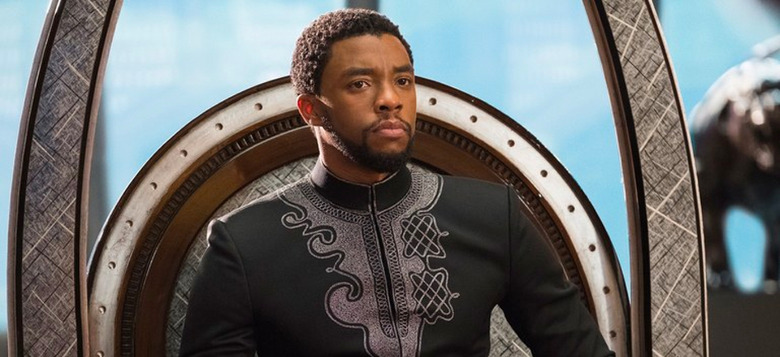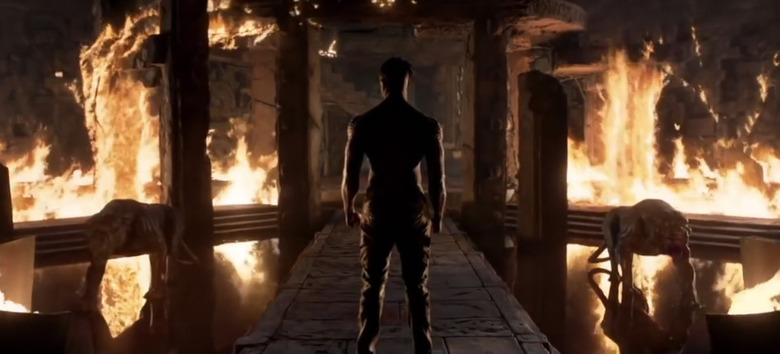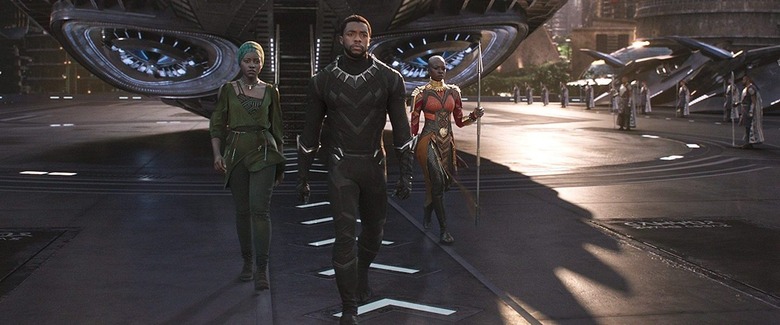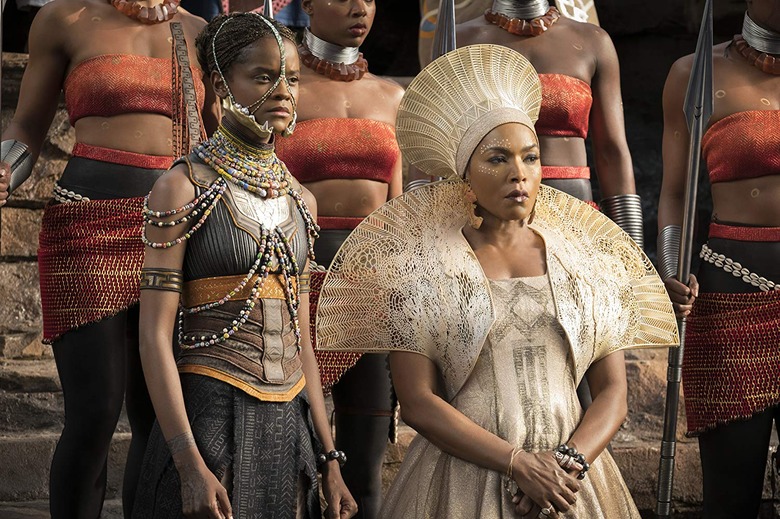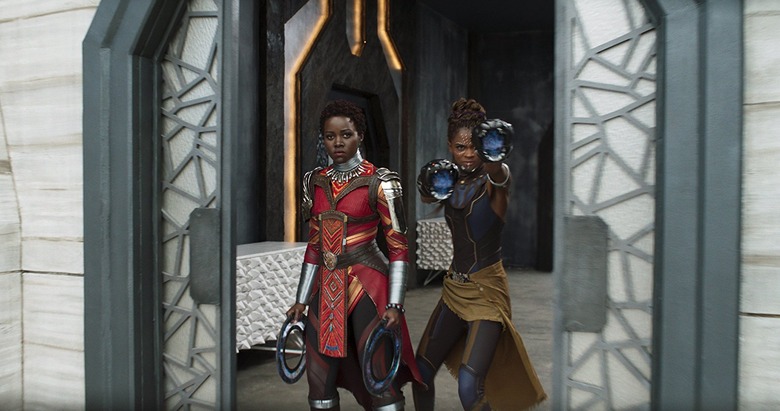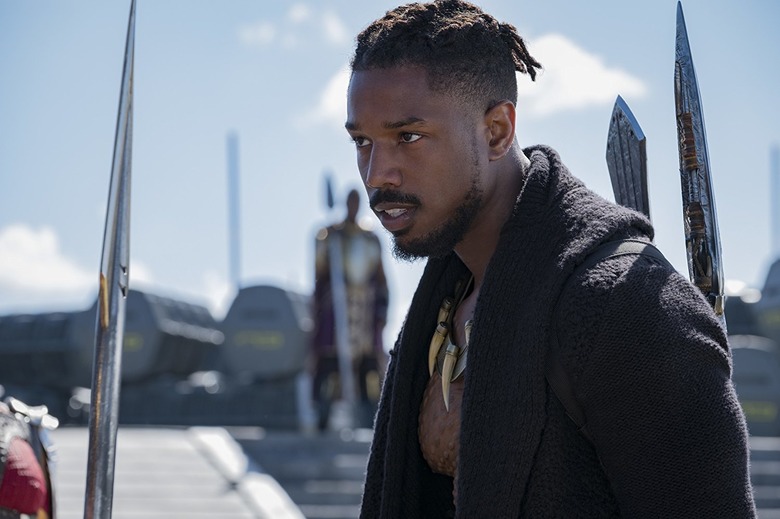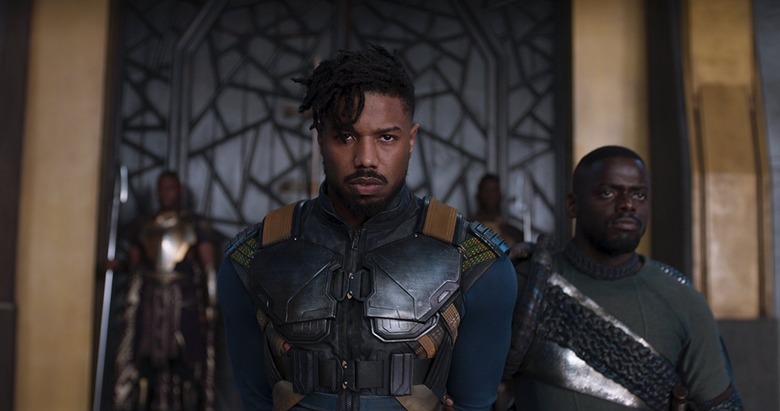Road To Endgame: 'Black Panther' Is Afrofuturist Fantasy That Reveals The Best And Worst Of America
(Welcome to Road to Endgame, where we revisit the first 22 movies of the Marvel Cinematic Universe and ask, "How did we get here?" In this edition: Black Panther, a Marvel film that finally tries to be honest about American politics)Black Panther is a sprawling superhero epic, the likes of which American cinema has never seen — or heard, for that matter, given the prominence of its African accents, treated anywhere from average to heroic; a far cry from the usual villainous or derisive framing of non-western voices in Hollywood. The film is one of the most important pieces of the Marvel puzzle, not necessarily in terms of long-term narrative (it's relatively isolated from its 17 predecessors) but rather, as a potentially landscape-shifting benchmark for mainstream filmmaking. It was also the first superhero movie nominated for Best Picture at the Academy Awards.It's hard to measure the full scope of film's legacy just a year after its release. However, it's safe to say that no American film since Marvel's own The Avengers has had this seismic an impact. Black Panther flew past all critical and financial expectations, shattering the long-held Hollywood myth that Black stars couldn't open films internationally. It also completed Marvel Studios' third act turn of stepping outside the norms of Western storytelling — as seen in Doctor Strange, Guardians of the Galaxy Vol. 2 and Thor: Ragnarok — albeit more substantially. Though, like several other Marvel films, its framing of American power is occasionally questionable.Black Panther is pop filmmaking at its finest, but its success is owed, in large part, to the creative lens through which it's told.
Afrofuturism
In his 1994 essay Black to the Future, cultural critic Mark Dery, in conversation with several prominent Black voices in criticism and science fiction, coined the term "Afrofuturism." It describes a creative philosophy that prioritizes stories, aesthetics and central themes drawn from African influence, as opposed to simply having these influences be window dressing, as is often the case in western sci-fi.The Oscar-winning costume and set designs of Black Panther are entirely steeped in this philosophy. The film builds on the visual and thematic language of Marvel movies past and injects them with new meaning. It's the result of a studio placing its trust in a creative team uniquely suited to the story — the film's most impactful line, "Bury me in the ocean, with my ancestors that jumped from the ships, because they knew death was better than bondage," is one director Ryan Coogler was encourage not only to keep, but to build the story around — and it could very well lead to other studios taking similar risks, redefining who gets to hold the megaphone of mainstream cinema.The film feels new to most Western eyes, and to most eyes in general, because of the degree to which it steps outside Hollywood's traditionally backward depictions of African cultures. The film lets Black creators craft a Pan-African tapestry that speaks, first and foremost, to members of the African diaspora, many of whom in America were robbed of their languages, names and specific cultural origins thanks to colonial slavery.In crafting the film's design, Marvel Studios let director Ryan Coogler bring on creative heads familiar to him, each of whom brought a sense of grounded familiarity to the fantasy of Wakanda. Coogler was joined by several of his Creed and/or Fruitvale Station cohorts: cinematographer Rachel Morrison (the first woman cinematographer nominated for an Oscar, for her work on Mudbound), composer Ludwig Göransson (a frequent collaborator of rapper Childish Gambino), and production designer Hannah Beachler, who also worked on Lemonade and Moonlight (both Göransson and Beachler were awarded Oscars for Black Panther).Coogler also sought a who's who of high-caliber creatives he hadn't yet worked with, like The People vs O.J. Simpson writer Joe Robert Cole, and legendary costume designer Ruth E. Carter (Selma, Malcolm X), who was also given the Academy Award for her work on the film. Not only was this an immensely talented roster with which to kick off the production, it was also a group whose artistic focus, at one point or another, had been the telling of Black narratives.In the process, Black Panther is imbued at every turn with unique visual and aural authenticity, remixed to create something new. For instance, the costumes and accessories of Wakanda's various factions, which take their cues from real African cultures: Suri for the River Tribe, Masai for the Mining Tribe, and Ruth E. Carter's own Basotho for the Border Tribe, led by W'Kabi (Daniel Kaluuya).Wakanda, an African superpower walled off from colonial influence, saw technological innovation evolve hand-in-hand with African tribal art & symbolism. The film presents technology and tribal culture as one and the same, as opposed to their usual western depictions as mutual exclusives. In addition to the aesthetics of Afrofuturism, Black Panther also leans into the philosophy's core thematic purpose: exploring the world — past, present and potential future — through a lens of Blackness.The film also understands, however, that Blackness is not a monolith.
A Clash of Perspectives
Wakanda represents the best and worst of modern America. While its unfettered progress yields unapologetically Pan-African designs, the nation stands locked in debate over the refugee crisis outside its borders. Shortly thereafter, an insurrection threatens to lead Wakanda to foreign invasion, which in turn leads to civil war.The recent change in leadership, from the late King T'Chaka (John Kani, Atandwa Kani) to his son T'Challa (Chadwick Boseman) has left the kingdom in a state of mournful reflection. In Captain America: Civil War, Wakanda's attempts to open up to the world led indirectly to deaths of its citizens in Lagos, and directly to the murder of its monarch. "The world is changing" has been the mantra of several Marvel characters, from T'Chaka, to The Vulture (Spider-Man: Homecoming) and beyond, but various factions in Wakanda disagree over how to adapt to that change.T'Challa is at the center of these warring ideas, a new king figuring out how to balance being a good man with being an effective leader. Like "Phase 3" heroes Thor (Thor: Ragnarok) and Star-Lord (Guardians of the Galaxy Vol. 2), T'Challa shoulders both a divine legacy, as well as the lies told by his father to maintain that legacy. A rotten foundation keeps each of their kingdoms standing.For T'Challa, the lie in question was T'Chaka murdering his brother N'Jobu (Sterling K. Brown) and abandoning N'Jobu's son Erik (Michael B. Jordan) in order to keep Wakanda a secret. When Erik, later "Killmonger," returns to exact vengeance, T'Challa must not only consider Erik's outlook on Wakanda and its refusal to provide aid, but the outlook of everyone around him.T'Challa is the central point linking all of Wakanda's ideological conflicts, each articulated by a uniquely alluring character who comes off in the right in some form or another. T'Challa's duty is to decide which parts of these conflicting ideals to consider before making his decisions. His responsibility is to compromise; a difficult position for a new leader of a global superpower, especially when the forces around him are defined by their clashing perspectives.
Tradition and Modernity
The clashing approaches to Wakanda are rooted in fun and likable characters, each of whom could just as easily get their own spin-off. T'Challa's sister Shuri (Letitia Wright), a young scientific inventor, is the nation's bright future. She cuts through Wakanda's stern regality with her memes and pop culture references — more specifically, references she picked up from western media.Shuri represents both technological progress and the more globalist perspective of the current, digitally connected youth. She also turns her back on tradition in the process. Whether or not she intends it, progress for Shuri means shedding cultural garb and making fun of ceremonies whose meaning she doesn't fully understand.Shuri's rejection of tradition doesn't sit well with M'Baku (Wintston Duke), leader of the mountainous Jabari, a tribe of anti-technology isolationists. Wakanda's forgotten people feel their identity is being trampled on, and so M'Baku holds T'Challa responsible for handing the kingdom's keys to "a child who scoffs at tradition." Though when the time comes for M'Baku to protect his kingdom, he's prepared to pledge his loyalty to T'Challa — not unlike Hanuman, the loyal Hindu deity worshipped by the Jabari.M'Baku's arc is modeled on tradition itself. In the Hindu epic Ramayana, Hanuman was the ape-like devotee of Lord Rama and his brother Lakshmana, exiled princes who enlist the help of Hanuman's tribe to defeat an evil ruler. As the story goes, Hanuman lifts and retrieves an entire mountain full of sacred herbs to revive an injured Lakshmana. The mountain-dwelling M'Baku plays a similar role. He rescues the fallen prince T'Challa, now exiled from his kingdom, and even revives him with the mystical Heart-Shaped Herb, before helping T'Challa reclaim his throne.M'Baku's serious demeanor is undercut by his cheeky playfulness when dealing with outsiders. The reveal that he's a vegetarian, rather than a cannibal, not only subverts the expectations of white American Everett Ross (Martin Freeman), but those of the audience, likely conditioned by Hollywood tropes to associate tribalism with savagery. M'Baku's willingness to play on these expectations makes him a joy to watch. He fits right in with Wakanda's fabric, despite living on its peripheries. The kingdom's citizens are fleshed out beyond the usual stone-facedness that tribal characters are often saddled with in American cinema. The people of Wakanda smile. They laugh. And they exhibit complete inner lives, in ways rarely afforded to African or African-coded characters in western science fiction.Given the similar playfulness with which Shuri interacts with T'Challa, one can't help but imagine she and M'Baku might have been be friends, were they able to come to an understanding.
The Women of Wakanda
Nakia (Lupita Nyong'o), T'Challa's former flame, wants to help the women of the surrounding African nations. But given Wakanda's isolationist policies, she's forced to fight from the shadows. A spy by profession, she slips out of Wakanda as quietly as she comes, and refuses to take up the throne alongside T'Challa if it means being unable to continue her missionsLike Shuri, Nakia also turns her back on tradition. She avoids both the throne, and the bright red garb of the Dora Milaje (the Panther's Royal Guard), in the hopes of embodying what she believes is the right path for Wakanda. Though eventually, when T'Challa decides to incorporate Nakia's outlook on foreign aid, she might have to stick around and see things through.After Killmonger overthrows T'Challa, Nakia clashes with Okoye (Danai Gurira), the fearsome head of the Dora Milaje, over how best to serve Wakanda. Their debate is rooted in both Nakia's lack of adherence to structure — a boon when she needs to act alone, a bane when called upon to defend her country — and Okoye's loyalty to the idea of the kingdom, to the point of rigidity.Defending Wakanda is all Okoye has ever known. However, before the throne was usurped by Killmonger, this had only ever meant defending the one family in control. Okoye has a friendly rapport with T'Challa and would defend him to the death, but her idea of loyalty is challenged when T'Challa is apparently killed in ritual battle. Okoye is then forced to wrestle with serving Wakanda's new king (the very man responsible for T'Challa's death) and his imperialist methods.Nakia and Okoye butting heads brings up a pertinent question: what does loyalty mean in the context of a nation state? Loyalty to its people and their ideals? Or loyalty to the structures that bind them? It's not unlike the challenge Thor faces in Thor: Ragnarok ("Asgard is not a place... It is a people") only here, rather than a last-minute plot device, it's the very fabric of the narrative.
Opening Up to the World
T'Challa makes the tough call to save a critically wounded Everett Ross, who was shot in the spine protecting Nakia. Okoye however, opposes bringing an outsider into Wakanda. It's here that T'Challa makes his first concrete change as a leader, choosing to save Ross' life despite his role as CIA officer, making him the most likely person to expose Wakanda's true nature to the world. The "Good leader" versus "Good man" tug-of-war, made absolutely urgent.Okoye even argues with her lover W'Kabi, T'Challa's childhood friend, over how to serve their new militaristic ruler. W'Kabi, whose parents were murdered when the foreigner Klaue (Andy Serkis) infiltrated Wakanda's borders, is adamant about not letting in outsiders, even refugees, who "bring their problems with them."T'Challa has W'Kabi in one ear and Nakia in the other, debating indirectly over how best to help outsiders, if at all. The king doesn't seem to know how to proceed — that is, until he sees the extreme effects of Wakanda's abandonment up close.Wakanda thus becomes a reflection of America's current debates over a security, refugees and foreign intervention, themes that coalesce in the form of justified antagonist, Erik Killmonger.
Killmonger’s Wakanda, Killmonger’s America
N'Jdaka/Erik Stevens, T'Challa's American cousin, is Wakanda's forgotten son. His father N'Jobu sought to use stolen Wakandan weapons to help oppressed African Americans rise up in Oakland — Ryan Coogler's hometown, and the birthplace of the Black Panther Party — but he was subsequently murdered by T'Chaka for his mutiny.This left Erik to grow up fatherless and on streets where death was common, cast out by those who ought to have taken care of him. Erik returns to Wakanda during its handover of power in order to take advantage of its vulnerability, in the hopes of overthrowing its king and waging war on other nations. Everett Ross, a CIA officer, ascribes this ruthless M.O. to the tools of U.S. military imperialism, which Killmonger learned as a black ops soldier. For once, a Marvel movie explicitly frames American foreign intervention in an honest light — the film's heroic framing of Ross, however, leaves a sour taste given the CIA's real-world involvement in coups, political arrests and assassinations in African countries like Ghana, Congo, Chad, South Africa and Angola. Killmonger hopes to reverse the effects of colonialism by helping Black people worldwide murder their oppressors, but there's a conservative, paradoxical streak to the way his politics are framed, just as there is to the ways Marvel at large approaches western power. For instance, U.S. military funding has a significant effect on the stories of Iron Man, Iron Man 2, Captain America: The Winter Soldier and Captain Marvel, which were subsequently locked in to military-approved scripts.The film's conflation of militant liberation with violent imperialism is a strange mixed metaphor, as the two are often at odds in the real world. A white CIA officer playing a heroic role in stopping Black revolution is in poor taste at best; at worst, it's another example of Hollywood's CIA propaganda. There are, of course, no publicly-released documents to corroborate this yet — would they have signed off on Shuri calling Ross a colonizer, I wonder? — but given Marvel Studios' relationship to the U.S. government for more than a decade, this approach to the film's CIA character is not out of the ordinary.The CIA's Operation CHAOS also targeted members of the Black Panther Party (most prominently, co-founder Huey Newton) between 1967 and 1974. Those optics aren't particularly great, since the film frames its distinctly American problems through fantasy metaphor, while its only American hero is a white CIA officer, yet its villain is an African American militant.Black Panther does, at least, attempt to have other characters describe Killmonger's plan as the re-creation of imperialism itself, rather than liberation, but this framing doesn't quite land with the intended impact. Not only because centuries of colonial structure can't be reversed overnight, but because we never actually see what's at stake outside Wakanda's borders, in the event that Killmonger carries out his plan and Wakanda's foreign sleeper agents are armed. Dramatizing this would have meant portraying the wider Black suffering Killmonger refers to, which feels like a step too far to the left for even the most ostensibly "progressive" Disney product.But while these literal aspects to Killmonger are muddied, Killmonger in the abstract is one of the most powerful elements in a Marvel movie, or any mainstream movie from 2018. He feels distinctly like a Ryan Coogler creation; he may as well be responding to police killings of unarmed Black men like Oscar Grant, whom Michael B. Jordan plays in Coogler's Fruitvale Station. From the moment Killmonger is introduced, his rage is clear and justifiable; he is the fallout of an empire like Wakanda sowing death and instability to protect its interests, not unlike America.Killmonger highlights the white lens through which stolen African artifacts are displayed and preserved in western museums, calling into question the idea of cultural ownership in a postcolonial world. Though, while he was cut off from his African roots like most African Americans, his personal motivations run even deeper. Killmonger is defined by a moment of violence from his childhood. Where T'Challa is able to access the wide-open plains of the afterlife, Killmonger's walkabout in the ancestral realm is limited to a single room: the apartment where he found his father's body. As a Black man in America, his inheritance is pain.His spiritual vision reduces him to a child once more. He was never given the kind of love, guidance, freedom or opportunity T'Challa was so frequently afforded. This forced him to turn to violence. The structures of American government that had failed him subsequently took advantage of his rage, granting him his ruthless nickname because of his willingness to kill for them.
Doing the Right Thing
Whether or not the storytellers were willing, Black Panther was likely unable to approach violence, or violent liberation, with more nuance. The film is, after all, the product of a conglomerate unlikely to alienate a white customer base. The lethal violence of Killmonger, aimed at white oppressors, is framed as a wholesale wrong; conversely, the narrative continually justifies T'Challa's lethal actions— as is the case with most Marvel films — like his freeing of Muslim women from a disposable Boko Haram analogue, a group of Black militants (Though, Nakia does at least stop T'Challa from killing one young soldier who doesn't know any better).This dichotomous approach to violence is questionable, especially for a film so steeped in racial politics. Referencing Black oppression, rather than showing it up close, may be more palatable to some viewers, but it makes for a less challenging narrative, given that Killmonger's motivations are rooted entirely in liberation from white supremacy. The film takes structural whiteness to task, but quietly, implicitly, and far off-screen.Regardless, Killmonger is still partially right, in that Wakanda ought to use its resources to help those in need. Eventually, Nakia's more empathetic methods are adopted by T'Challa, but only after Killmonger re-orients his perspective.Killmonger and T'Challa inherit their fathers' legacies, grounding Marvel's usually abstract paternal disappointment — General Ross, Howard Stark, Hank Pym, Odin, Ego, and so on — in an explicit sociopolitical ethos. T'Chaka's lies didn't just keep a fictional kingdom secret. They resulted in the refusal to help an over-policed, over-incarcerated African American citizenry, resulting in the realistic hardship of an orphaned Black child.As much as Wakanda is a fantasy, it's a grim reflection of America itself; Erik Stevens, a young Black boy, is punished for his father's crimes. In the end, T'Challa needs to right this wrong most of all. His decision to start outreach programs in Oakland — starting with Erik's old neighborhood — feels particularly meaningful. Not only does it help Wakanda confront its fictional sins, but the decision is also similar to Coogler's real-world desire to bring film business to Oakland as an alternative to crime. And so, T'Challa being approached by a young, awestruck Black boy in Oakland, not unlike Killmonger all those years ago, is the perfect culmination.Black Panther comes down on the side of foregoing the rigidity of borders and helping those in need, regardless of their origins. It pushes unequivocally for positive change in the status quo, rather than falling back on westerns norms as defaults that must be defended — as has been the case in almost every Marvel movie, especially those subsidized by the U.S. military.T'Challa's father T'Chaka used the Black Panther mantle to strip away a child's future. In turn, that child attempted to use the Black Panther as a tool of oppression. T'Challa on the other hand, uses the Black Panther to help and inspire, just as the film itself is likely to catalyze change, and show young Black filmmakers and other young artists of colour what's possible in cinema.
***
Expanded from an article published April 25, 2018.

